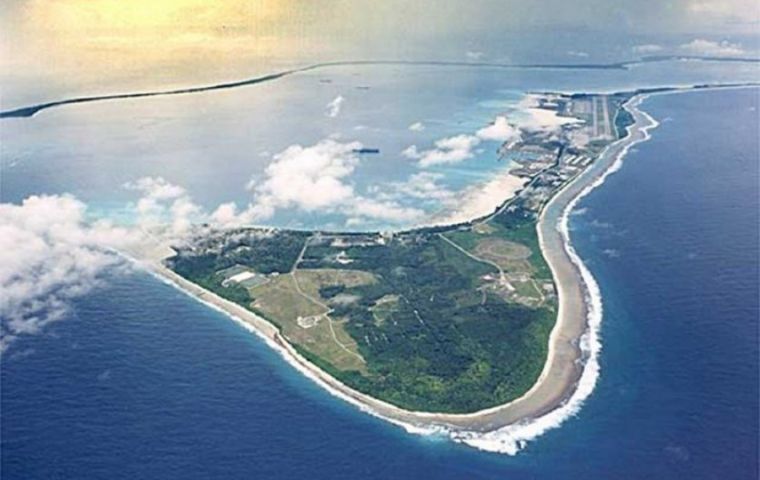MercoPress. South Atlantic News Agency
ICJ will rule on the Chagos people UK/Mauritius dispute on Monday
 Judges at the International Court of Justice will give their opinion on the future status of the remote Indian Ocean archipelago housing US base of Diego Garcia
Judges at the International Court of Justice will give their opinion on the future status of the remote Indian Ocean archipelago housing US base of Diego Garcia The UN's top court will hand down its view on Monday, February 25, in a bitter dispute between Britain and Mauritius over the fate of the Chagos islands, home to key UK and US military base.
Judges at the International Court of Justice will give their opinion on the future status of the remote Indian Ocean archipelago housing the US base of Diego Garcia, leased from Britain on territory claimed by Mauritius.
Colonial power Britain between in the late 1960s and early 1970s evicted around 2,000 Chagos islanders to Mauritius and the Seychelles to make way for the base, in a lease which expires in 2036.
Chagos islanders - who have been banned from visiting the islands without special authorization - have been fighting for their return since first launching legal action in 1975, with some receiving compensation from London in 1982.
In a new diplomatic blow to Britain, the UN General Assembly in 2017 adopted a resolution presented by Mauritius and backed by African countries asking the ICJ to offer legal advice on the island chain's fate.
The ICJ's 15-judge bench will now hand down a non-binding “advisory opinion” at 1400 GMT at its headquarters at the Peace Palace in The Hague.
London split off the remote islands from Mauritius three years before Port Louis gained independence in 1968. Their status has since been at the centre of a bitter dispute spanning five decades.
During the Cold War, London established a combined military base with the US on Diego Garcia, the largest of the islands, which was a key staging ground for bombing campaigns in Iraq and Afghanistan.
Judges heard the case in September, with Mauritius arguing that it was illegal for London to break up its territory while still under colonial rule. Its case was backed by India.
Chagos, said Port Louis' lawyers, was “integral to Mauritius” and that the decolonization process of the island group “remains incomplete.”
Britain in turn apologized for the “shameful” way it evicted thousands of islanders but insisted Mauritius was wrong to bring the case to the ICJ.
The US meanwhile said the court had a “duty” not to take a position on the row.
Experts said that should the ICJ's judges give an opinion, it is most likely to revolve around the legality of Britain's move to split Chagos from Mauritius - which lies some 2,100km to the southwest.
“The main question will be whether separating the two was - at the time - a breach of international law in the sense that it did not respect the right of self-determination of the Chagossians,” said Eric De Brabandere, a professor of international law at the University of Leiden.
“I think that the court will say something about the right to self-determination of the Chagossians now, and the need to complete the decolonization process,” he said.
But, “as usual it is difficult to predict”, de Brabandere said.




Top Comments
Disclaimer & comment rules-

-

Read all commentsICJ should not be giving an uninvited opinion without any formal agreement between both parties...
Feb 23rd, 2019 - 12:46 pm 0So an 'implanted colonial' population has rights after all. Will the UN be consistent and apply this standard to the Falkland Islanders?
Feb 26th, 2019 - 06:16 am 0Commenting for this story is now closed.
If you have a Facebook account, become a fan and comment on our Facebook Page!